Last Updated on 4 months by Christopher Jan Benitez
As a content marketer, you know how important it is to have the right tools to help you create and distribute high-quality content.
But with so many available options, figuring out which digital marketing tools are worth your time and money can be overwhelming.
Not only do you want to choose tools that will save you time and make your job easier, you also want to ensure they are effective and help you produce results. Using the wrong tools can lead to wasted time, missed opportunities, and subpar content.
That’s where this article comes in.
We’ve compiled a list of 25 of the best content marketing tools you’ll need to succeed.
These tools have been carefully selected based on their effectiveness, efficiency, and value for content marketers.
Whether you’re just getting started in content marketing or a seasoned pro, these tools will help you create, optimize, and distribute high-quality content that engages your audience and drives results.
Content Research
For starters, content marketers need to gather information on what to write in their content. Below are tools that will aid them in their research:
#1 – LowFruits
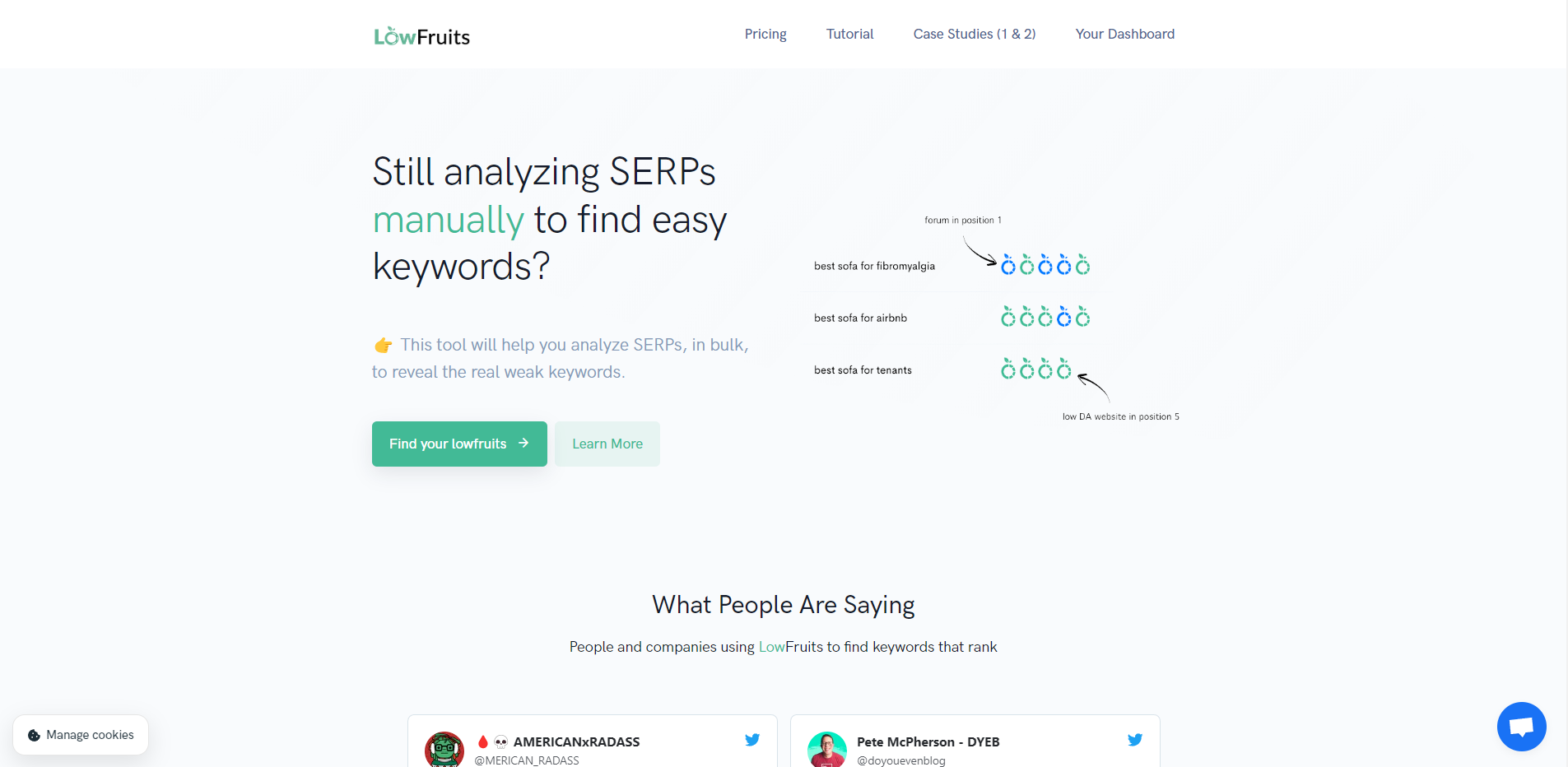
LowFruits is a keyword research tool that helps you find long-tail keywords in your niche with the click of a button. Long Tail Pro is another tool you can use for this, but LowFruits is much better at this point.
These keywords are sourced using Google’s autocomplete feature, ensuring that they are relevant and actively searched for by users.
In addition to being cost-effective and offering a pay-as-you-go credit system, LowFruits also has a user-friendly interface and minimalistic design that is easy for beginners to navigate and understand.
All these features are ideal for content marketers looking to boost their site’s topical relevance.
By optimizing for long-tail keywords the tool will find, they can increase their site’s authority in the topic, thus increasing their rankings and organic traffic.
Sign up now and get ten free credits for the keywords you need.
#2 – Social Animal
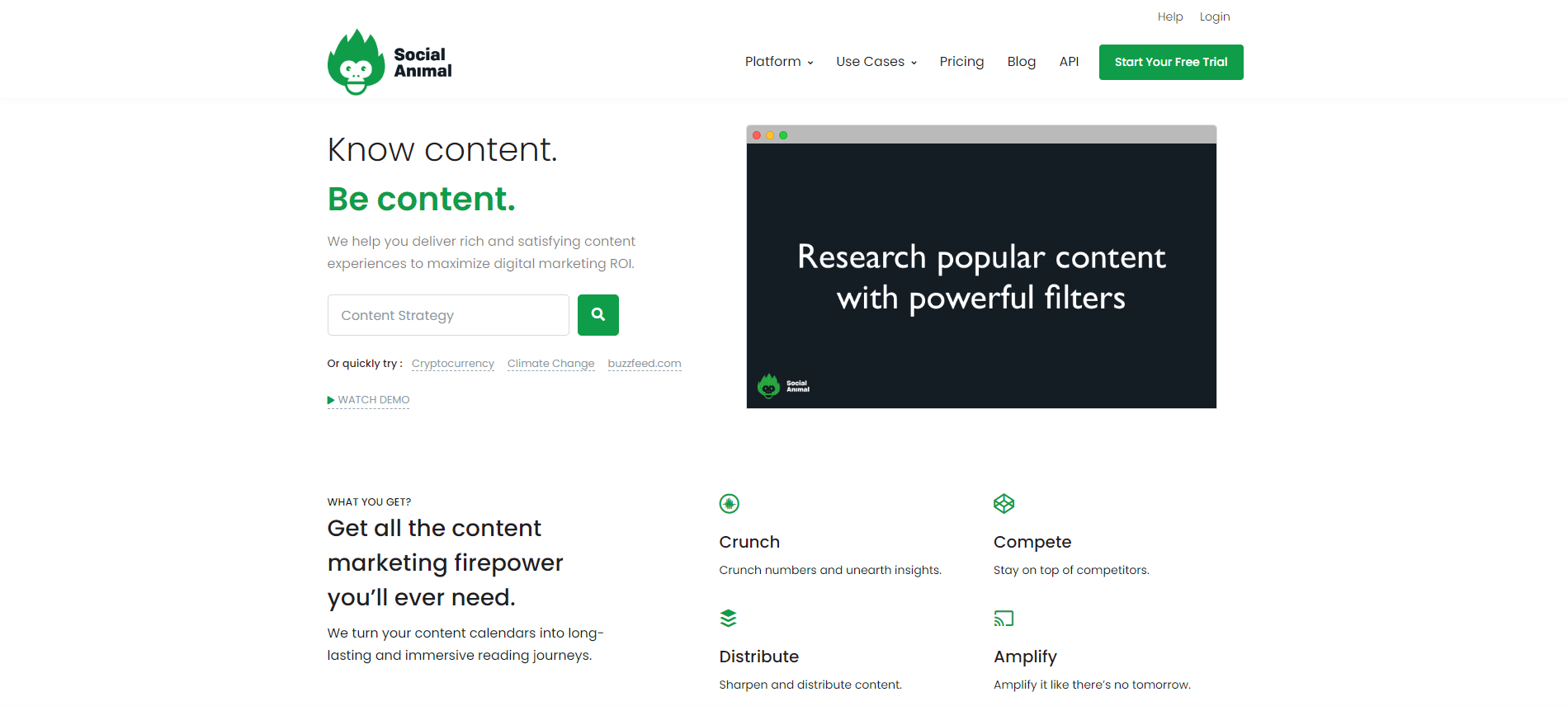
Social Animal helps marketers analyze top-performing content, articles, and authors based on the keywords they searched for.
Its search capabilities streamline the research process and reduce the time it takes to find relevant results. From here, they can draw insights from the data gathered by the tool to help them build their content marketing strategy.
For instance, if their competitors have a piece of content driving them the most traffic via social media, they need to replicate the content to achieve the same results.
Another feature that’s useful for marketers is the Influencer Search. They can type in their niche or industry to search for the most popular social influencers based on their number follower count.
From here, they can try and reach out to these influencers to strike a partnership or arrangement they can leverage to their benefit.
With all the features in one platform, it’s easy to navigate and find the information needed to make actionable decisions about content marketing strategies and tools.
#3 – Serpstat
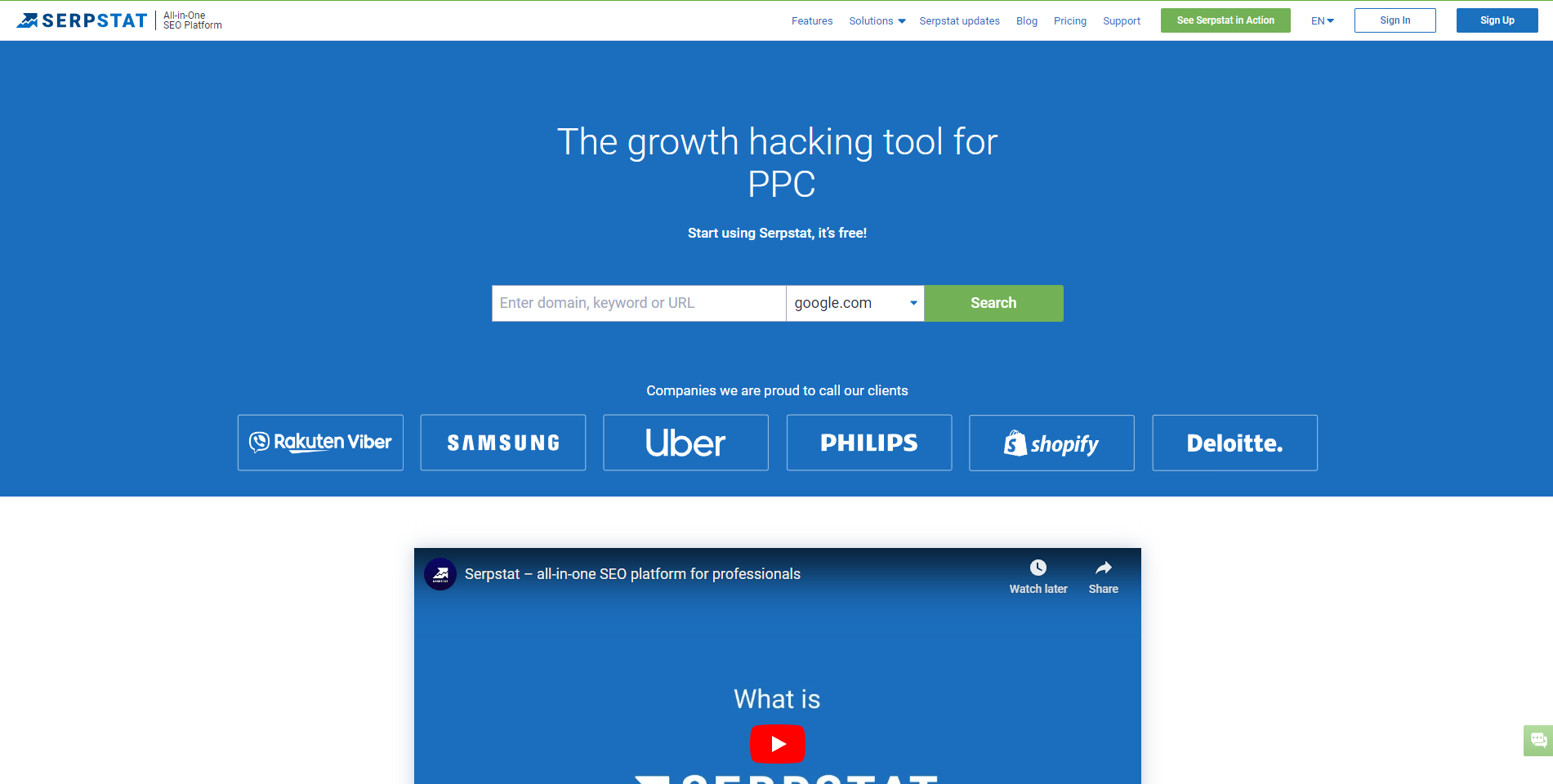
Serpstat is a digital marketing tool that offers a range of features, including keyword research, website analysis, and content marketing. It is designed to help users improve their search engine optimization (SEO), pay-per-click (PPC) advertising, and content marketing efforts.
Some specific features of Serpstat that may be useful for content marketers include:
- Keyword research – Allows users to see the search volume, difficulty, and cost-per-click (CPC) for various and related keywords and phrases. This can help content marketers choose the right keywords to target in their content.
- Content ideas – This feature suggests popular and relevant topics to a user’s website or industry. This can help content marketers generate ideas for new content creation.
- Competitor analysis – Serpstat allows users to see the keywords and content their competitors rank for. This can help content marketers identify opportunities to differentiate content and improve search rankings.
Serpstat offers a range of features to help users research and optimize their content for search engines and target audiences.
#4 – Contentpace
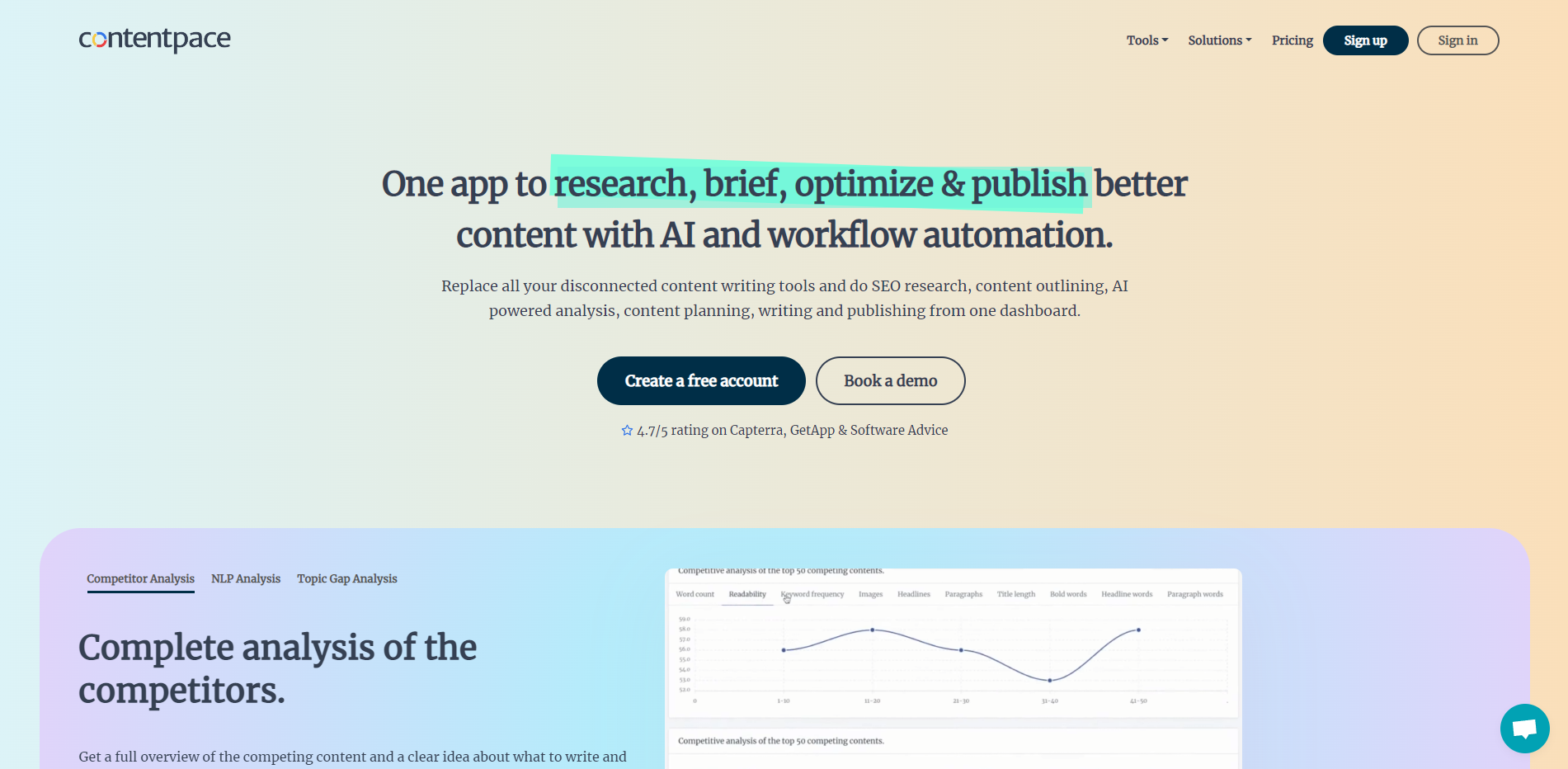
Contentpace is a content planning tool that simplifies creating content briefs.
It offers a range of features, including a content scraper that quickly gathers top local search engine results page (SERP) results, support for multiple languages (including French), fully localized SERP results, a content brief builder, accurate data from Google SERP, and an article source viewer.
These features make Contentpace valuable for saving time and streamlining the content research process.
The user interface is simple and easy to use, making it an excellent choice for those who want to quickly gather the information they need and get started on their content.
Content creation tools and apps
The next batch of content management apps and software can help marketers create and collaborate on new content with other content creators in their organization.
#5 – Canva

Canva is a graphic design platform that allows users to create visual content, such as logos, presentations, posters, social media graphics, and other types of visual content.
The range of features the tool offers can help marketers create professional-looking visual content quickly and easily, which includes the following:
- A large library of design templates – Canva offers a wide range of templates for different types of visual content, including social media graphics, logos, presentations, and more. This can save content marketers time and effort by providing a starting point for their designs.
- A simple, intuitive interface – Canva’s drag-and-drop interface makes it easy for users to customize templates or create designs from scratch, even if they don’t have much design experience.
- Collaboration tools – Canva allows users to share their designs with others and collaborate on projects in real time, making it easier for content marketers to work with a team or clients.
- A range of design elements – Canva offers a wide range of design elements, including fonts, images, and graphics, that users can incorporate into their designs. This can help content marketers create visually appealing and professional-looking content.
#6 – CoSchedule’s Headline Studio
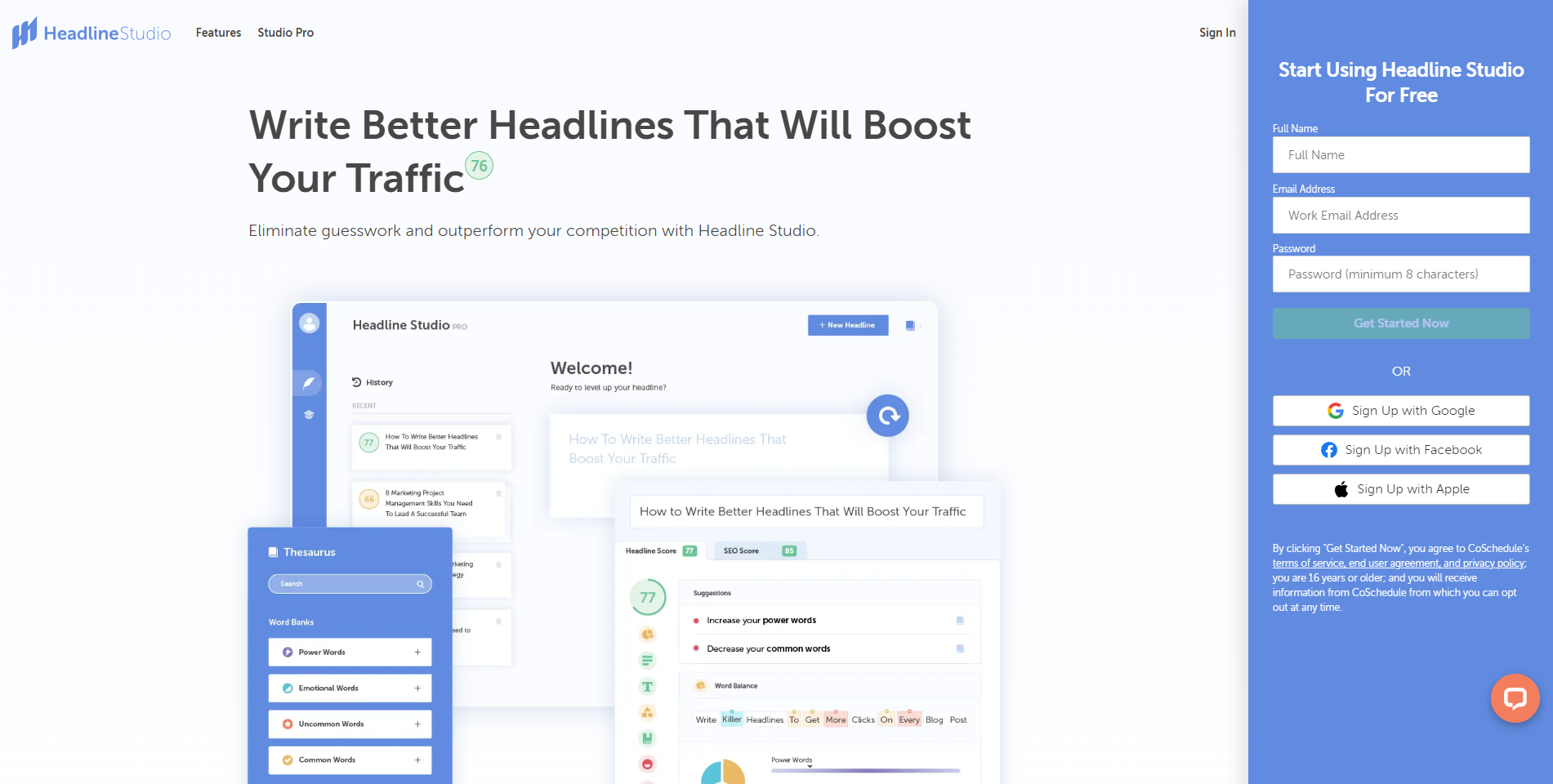
CoSchedule’s Headline Studio helps users create headlines for their content optimized for search engines and social media platforms and effectively engages readers.
Headline Studio uses artificial intelligence (AI) to analyze and score headlines based on factors such as their length, structure, word balance, and other variables.
From here, marketers can keep creating variations for the headline about these factors to get a much higher score every time.
The tool’s Pro version provides users with suggestions on improving the headline’s score and increasing its click-through rate.
#7 – InVideo
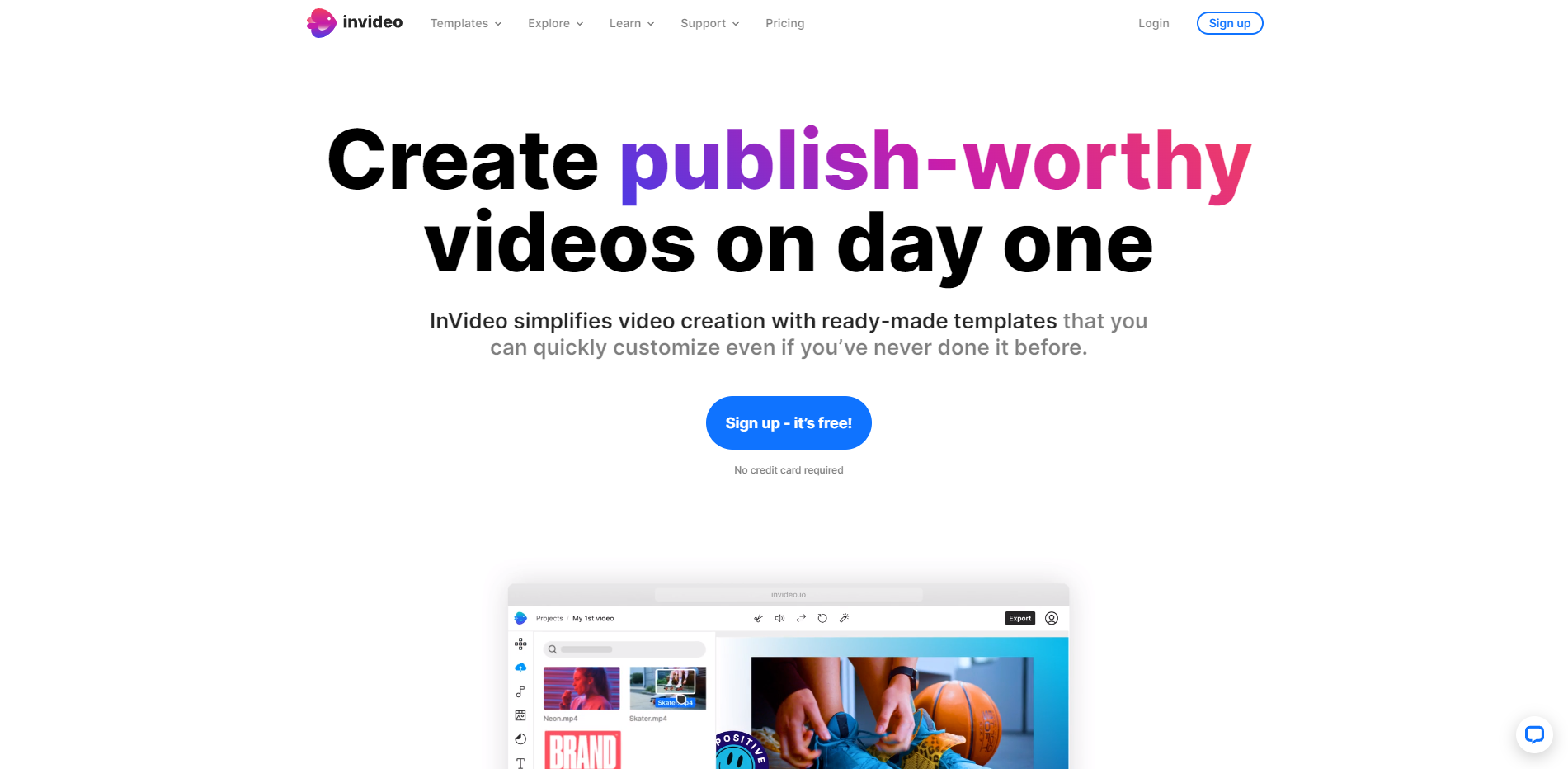
InVideo allows users to create professional-quality videos quickly and easily. It provides users with access to a range of templates and design elements, such as images, videos, and music, that they can use to create their videos.
Some specific features of InVideo that may be particularly useful for content marketers include:
- A large library of templates – InVideo offers a wide range of templates for different types of videos, such as promotional, explainer, and social media. These templates give users a starting point for their videos and can save them time and effort.
- A simple, intuitive interface – InVideo’s drag-and-drop interface makes it easy for users to customize templates or create videos from scratch, even if they don’t have much video editing experience.
- Collaboration tools – InVideo allows users to share their videos with others and collaborate on projects in real time, making it easier for content marketers to work with a team or clients.
#8 – Jasper.ai
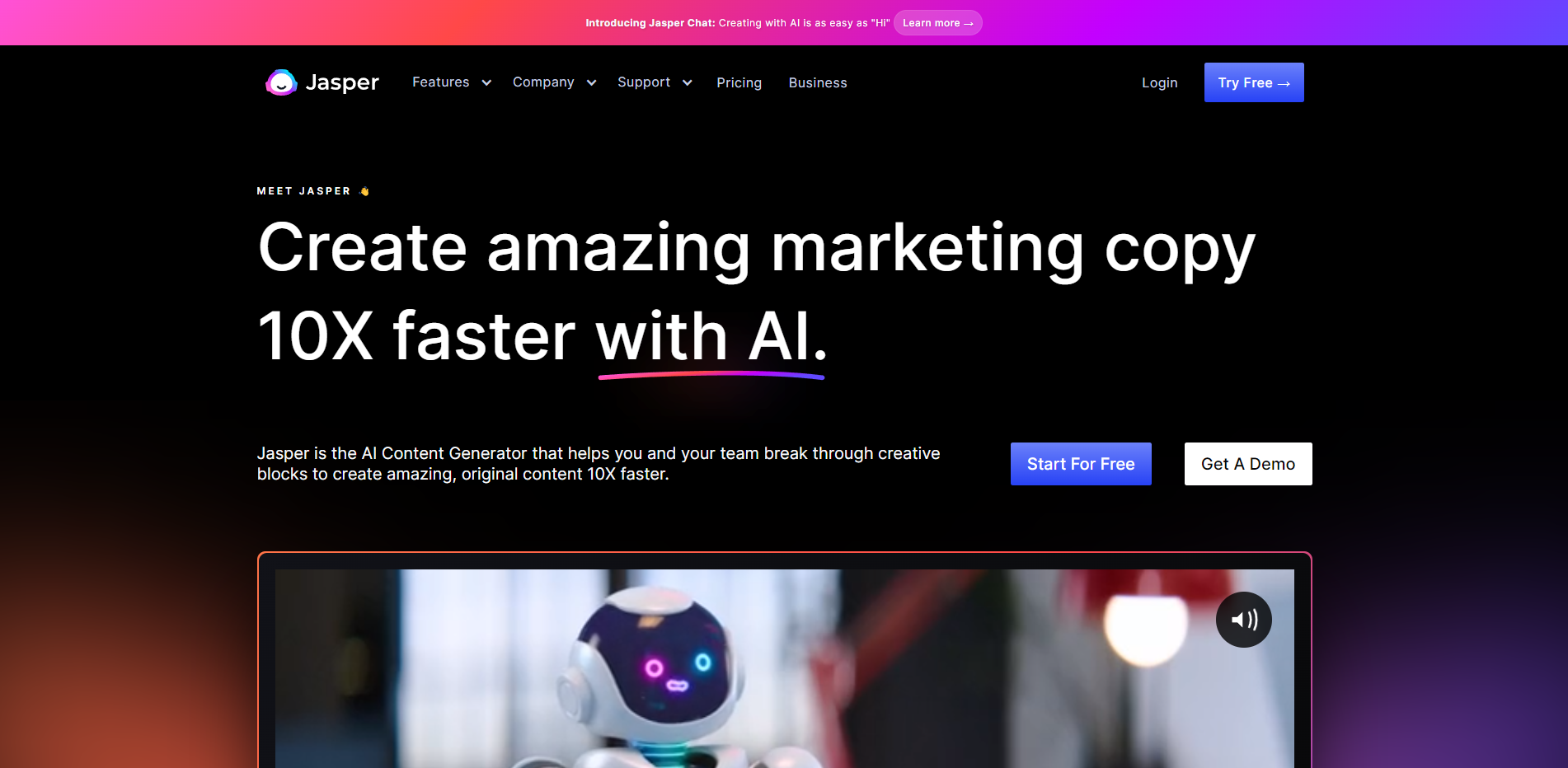
Jasper.ai is a content writing tool that helps users save time and money by outsourcing their content production.
With over 50+ templates to choose from and AI-generated output that is 99.99% original and free of plagiarism, Jasper.ai is a great investment for bloggers and business owners looking to create high-quality, SEO-friendly content at scale quickly.
The tool’s “Boss Mode” feature unlocks a long-form assistant that enables users to easily write full blog posts, marketing emails, or even books, eliminating writer’s block and increasing productivity.
From a content marketer’s standpoint, they can use the platform to develop blog or social media posts quickly.
While the content may require editing, the heavy lifting has been done, thus helping them cut down the time in their content creation process.
#9 – ChatGPT
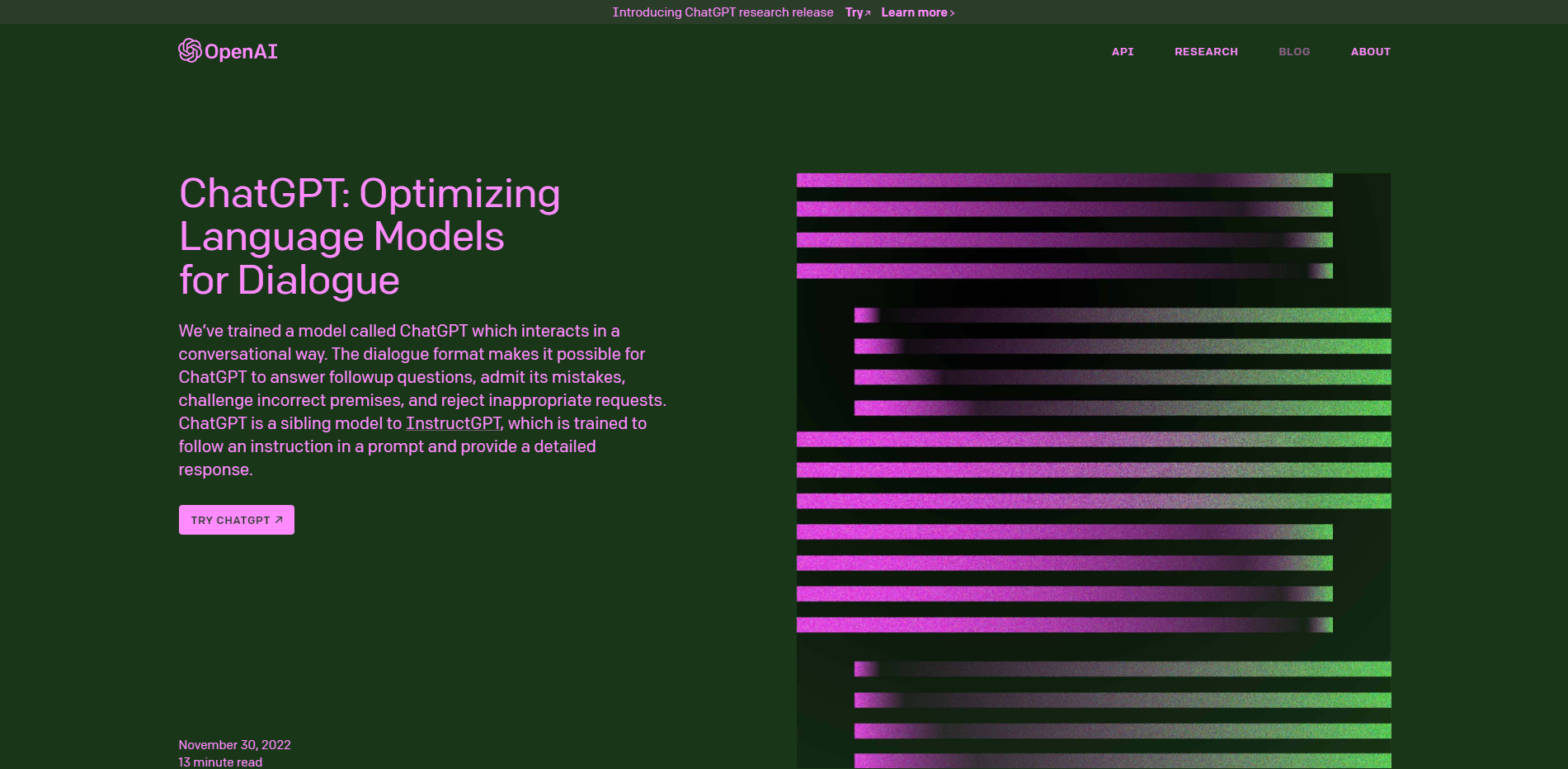
ChatGPT is a chatbot developed by OpenAI using the GPT-3.5 large language model.
It is trained to interact with users conversationally, using predictive technology and reinforcement learning with human feedback to generate responses that are satisfactory to humans.
As a result, ChatGPT can produce responses that seem remarkably human-like.
There are lots of marketing use cases for ChatGPT. But content marketers can use it the same way as Jasper.ai.
They can ask the chatbot to generate a block of text about a topic to produce their content’s foundation. From here, they can edit the piece and add their insights before publishing it into a blog post.
Again, this tremendously cuts the time from writing a piece of content and allows marketers to expedite their campaign progress.
Proofreading tools and apps for content marketers
After writing the content, you want to edit and proofread them first in case the writer has made mistakes. To make the editing process much more convenient, below are the top three editing tools for marketers:
#10 – Grammarly
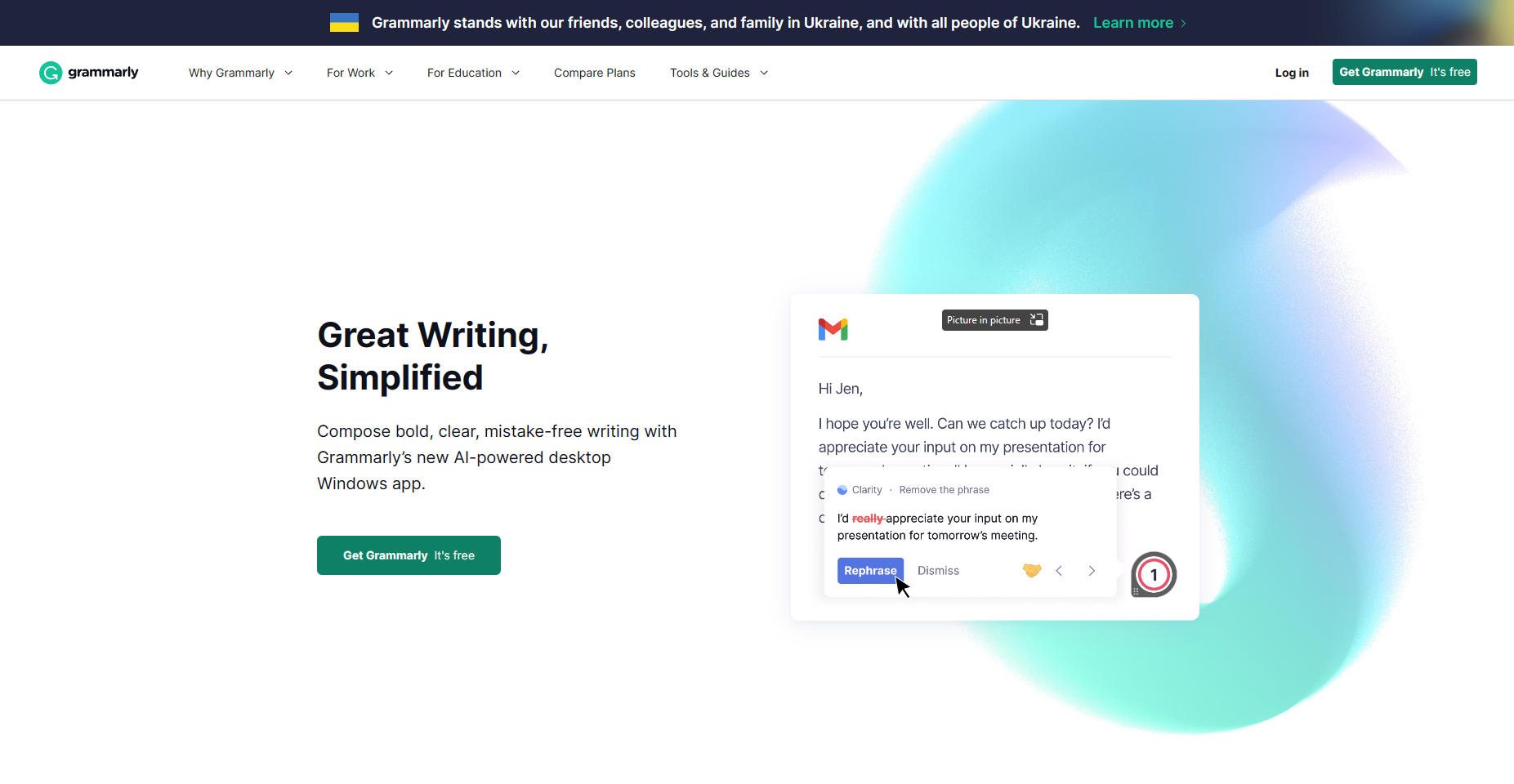
Grammarly is a web-based tool that helps users improve their grammar, spelling, and punctuation.
You can also use it to provide real-time feedback on their writing, highlighting errors and suggesting corrections.
Some specific features of Grammarly that may be particularly useful for marketers include:
- Contextual spelling and grammar checking – Checks for grammar, spelling, and punctuation errors in real-time as users write, providing them instant feedback and suggesting corrections.
- Plagiarism detection – Helps marketers avoid accidental plagiarism by checking their writing for unoriginal content and alerting them to potential issues.
- Vocabulary enhancement – Suggests alternative words and phrases that may improve the clarity and impact of a user’s writing.
- Custom writing style guides – Allows users to create custom writing style guides that specify their preferred writing conventions and help them maintain a consistent tone and style in their writing.
#11 – Hemingway Editor
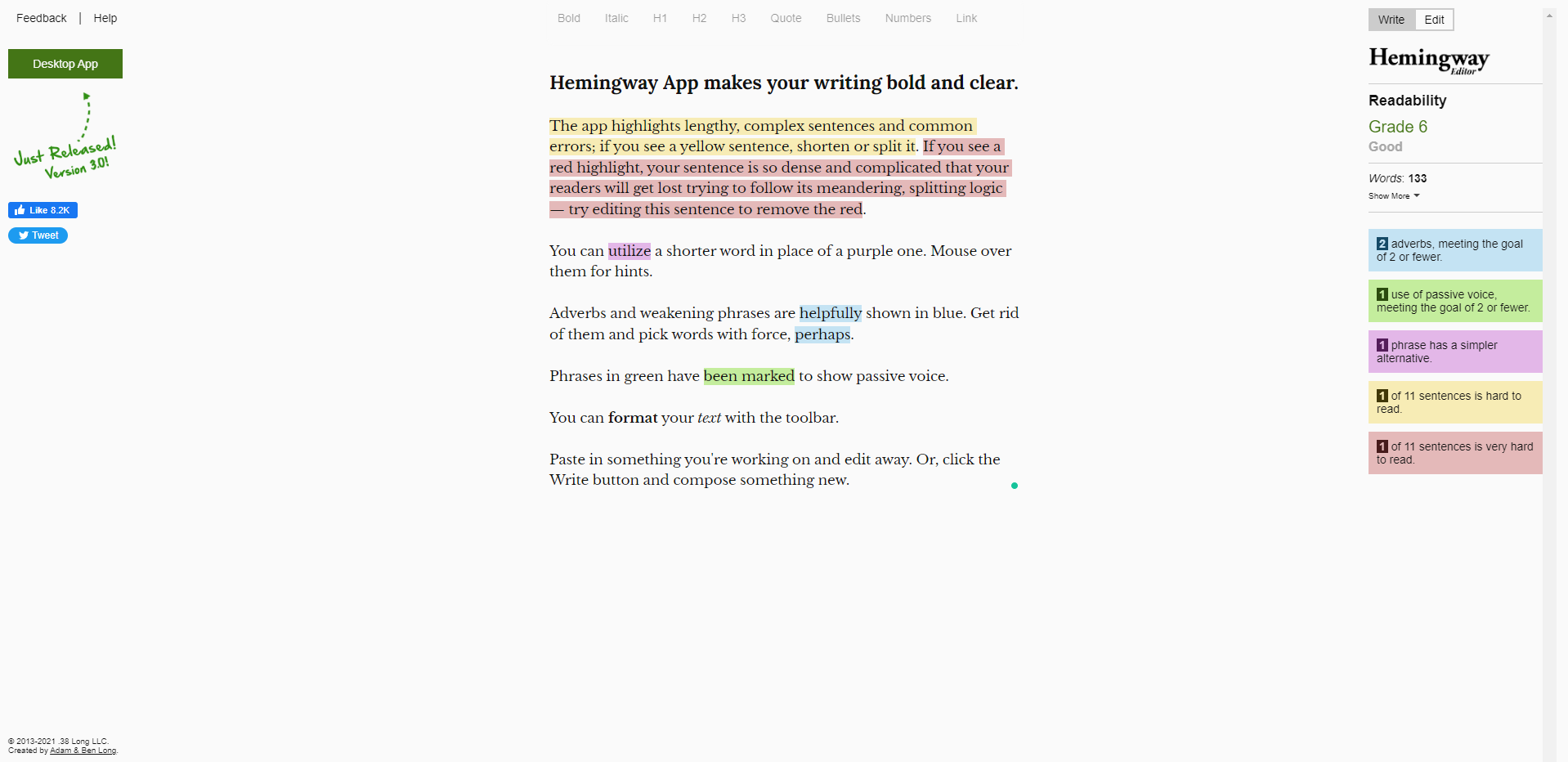
Hemingway Editor is one of this list’s few free content marketing tools. It is a writing tool that helps users improve the clarity and readability of their writing in real-time.
It may be a good content editing tool for marketers because it offers a range of features to help them produce clear, easy-to-read content, such as:
- Readability scoring – Uses a readability score to assess the complexity of a user’s writing and provide suggestions for improvement. This can help marketers create content that is accessible to a broad audience.
- Simplification suggestions – Suggests simplifying complex sentences and phrases, making it easier for readers to understand and engage with the content.
- Text highlighting – Hemingway Editor highlights words and phrases that may be difficult to read or understand, making it easier for users to identify areas that need improvement.
#12 – ProWritingAid

ProWritingAid is yet another content marketing tool in the same vein as Grammarly. It provides users with real-time feedback for improving the grammar, style, and clarity of their writing.
Some specific features of ProWritingAid that may be particularly useful for marketers include:
- Grammar and style checking – Reviews content for grammar, spelling, punctuation, and style errors and suggests corrections.
- Clarity and readability improvements – This feature suggests ways to improve the clarity and readability of a user’s writing, making it easier for readers to understand and engage with the content.
- Custom rules and alerts – Allows users to create custom stylistic rules specifying their preferred writing conventions and help them maintain a consistent tone and style.
Content marketing collaboration tools and apps
Below is a list of collaborative project management tools for keeping a website or content marketing project going smoothly. They help align everybody in the the organization with their content goals and produce the right content for their campaign:
#13 – Trello
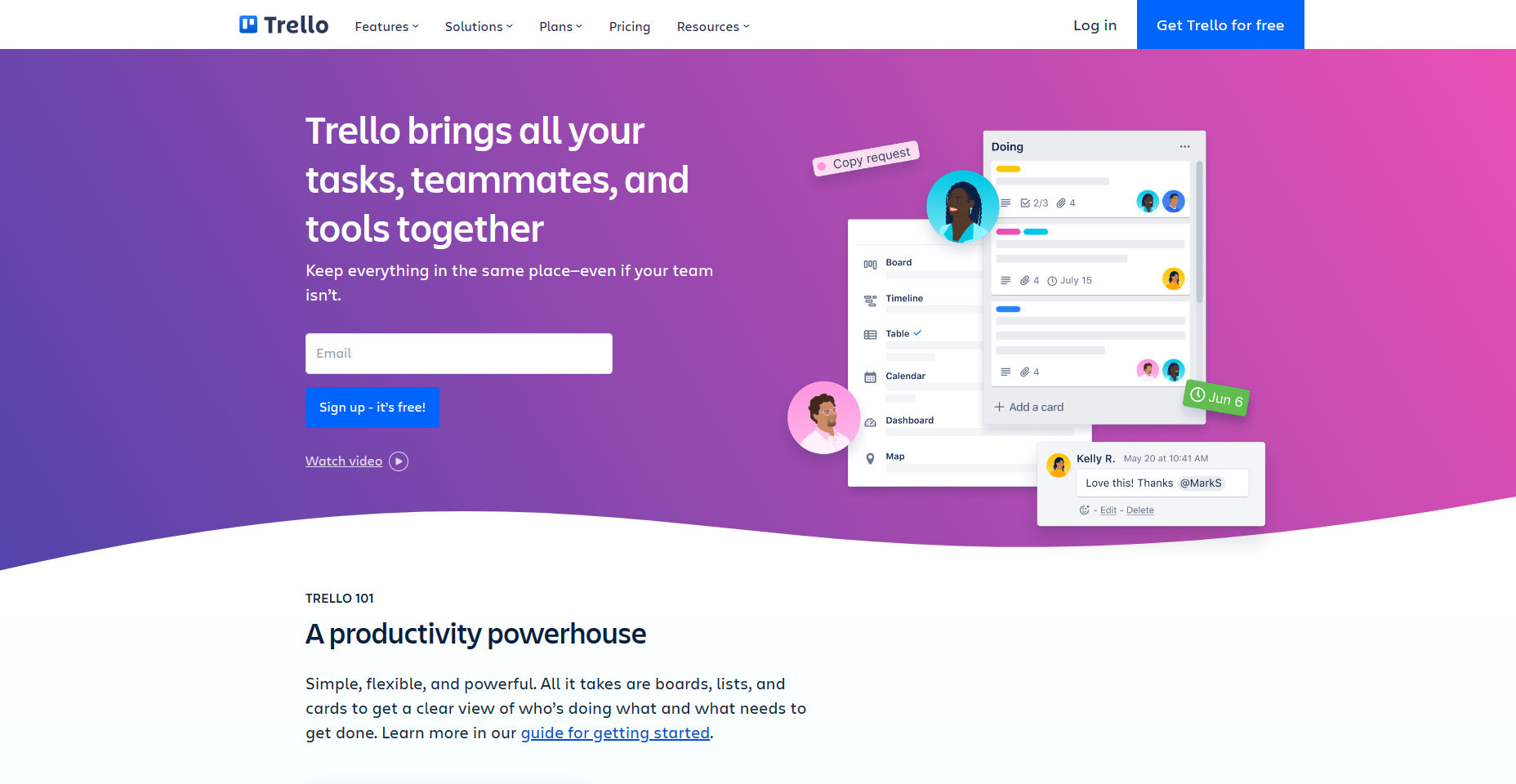
Trello is a project management tool that allows users to visualize their work via a system of “boards,” “lists,” and “cards” for better organization and prioritization of tasks.
Some specific features of Trello that may be particularly useful for marketers include:
- Customizable boards – Allows users to create custom boards that reflect their workflow and organization needs. This can be useful for marketers who need to coordinate and track the progress of multiple content projects.
- Collaboration features – Allows users to invite others to join their boards and work on their content marketing strategy together. It also has features such as comments, @mentions, and file attachments that make it easy for team members to communicate and collaborate.
- Task management – Its lists and cards allow users to break down their tasks into smaller, more manageable pieces and track their progress. This can be useful for marketers who manage multiple tasks and deadlines for their content projects.
- Integrations – Connects with tools like Google Drive, Slack, and Evernote, making it easy for marketers to work with their existing workflow and tools.
#14 – Google Drive
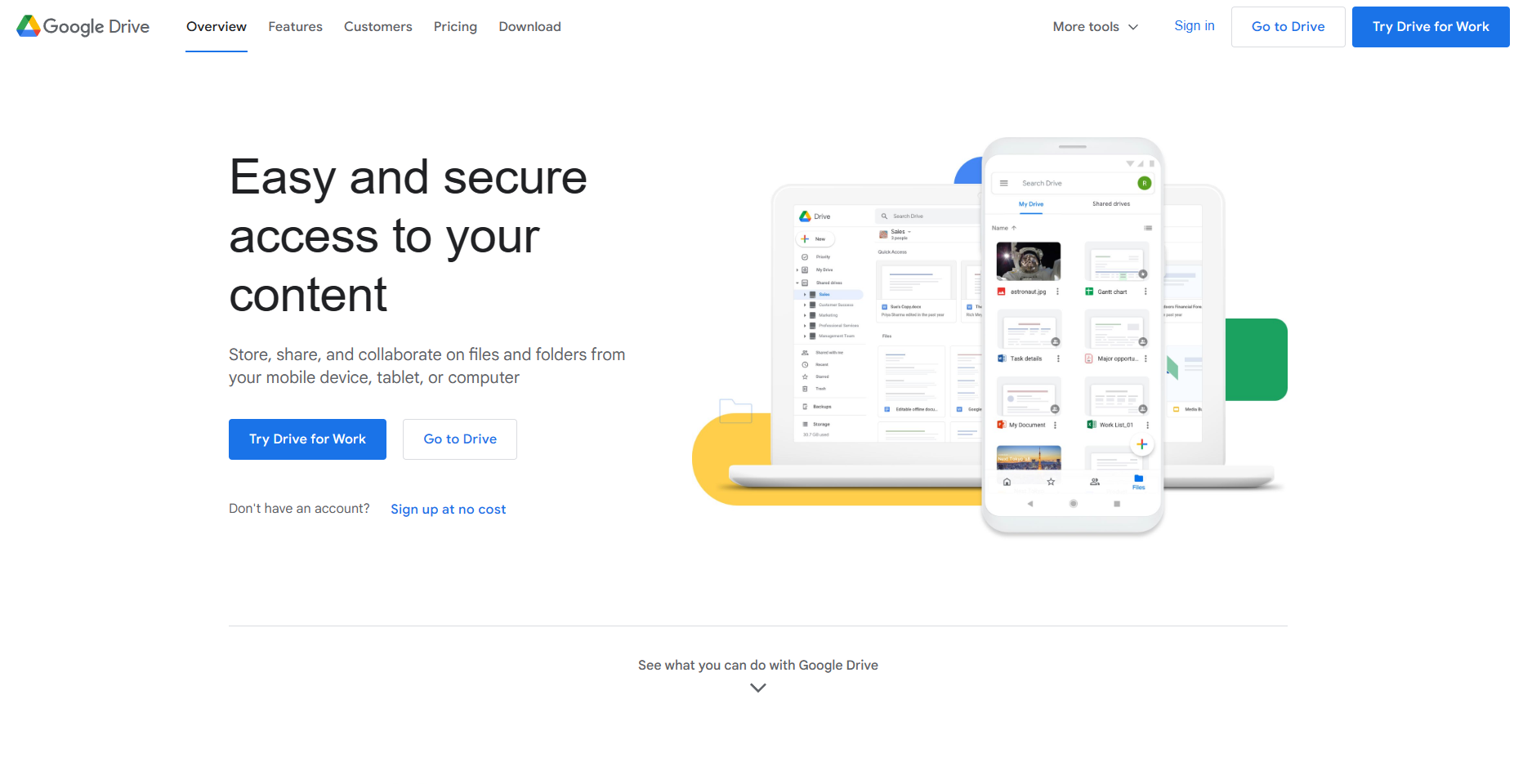
Google Drive is a cloud storage service that allows users to create, store, share, and collaborate on various file types like Google Docs, Sheets, and Slides.
Some specific features of Google Drive that may be particularly useful for marketers include:
- File sharing – Allows users to share files with others and specify what level of access they should have. This can be useful for marketers who need to collaborate on content projects with team members or clients.
- Real-time collaboration – Its suite of productivity tools, such as Google Docs, Sheets, and Slides, allows multiple users to edit and comment on the same file in real time. This can help marketers coordinate their efforts and ensure that everyone works from the most up-to-date file version.
- File revision history – Records all changes made to a file, allowing users to see who made what changes and when. This can be useful for marketers who need to track the progress of a project or resolve any conflicts that may arise.
- Mobile access – The tool is available on iOS and Android devices, allowing users to access and edit their files from anywhere. This can be useful for marketers who need to collaborate on the go.
#15 – Dropbox
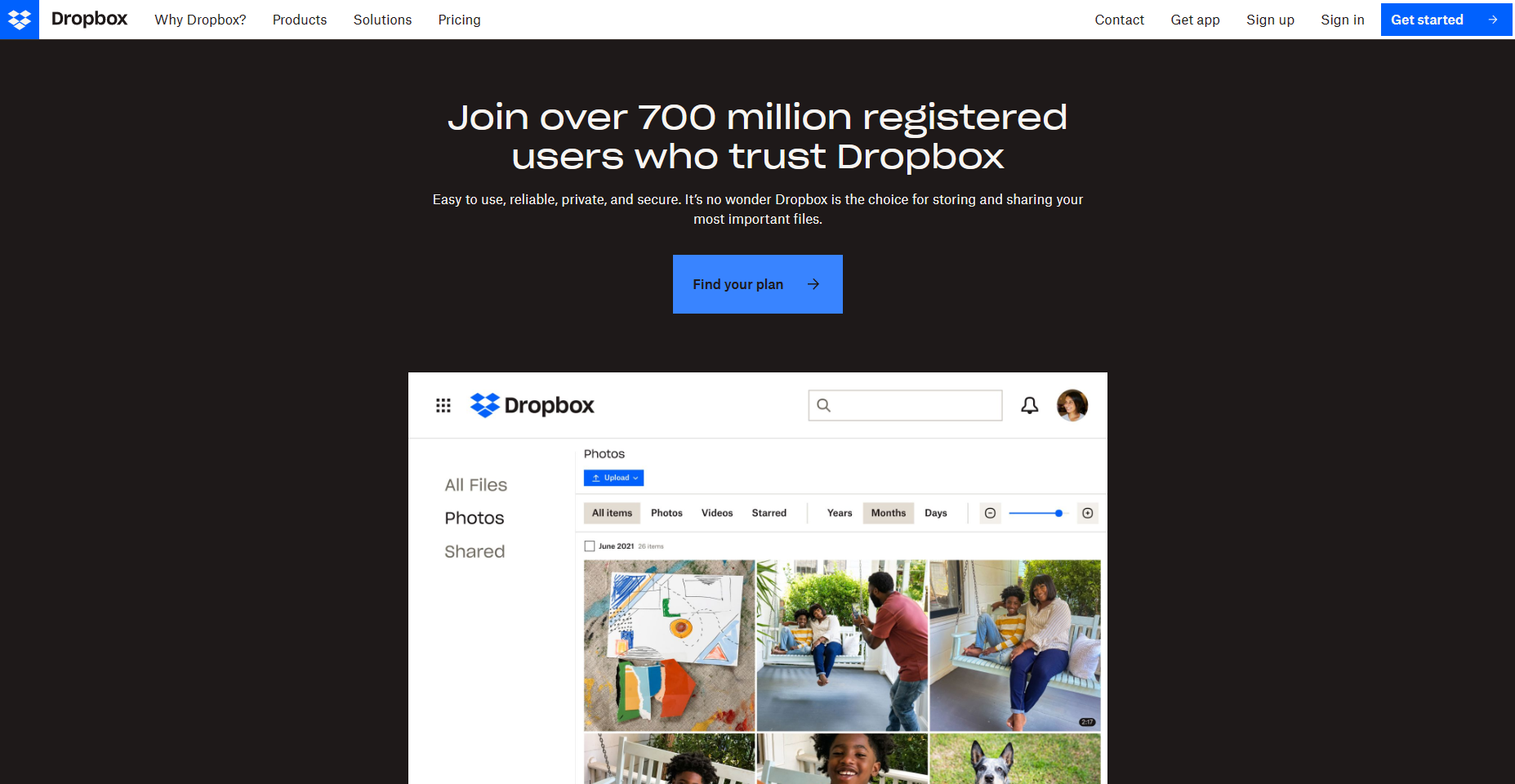
If you’re not a fan of Google products, Dropbox is a good alternative to Google Drive.
It’s a web-based file management service that allows users to store, share, and work on files.
Some specific features of Dropbox that may be particularly useful for marketers include:
- File sharing – Allows users to share files with others and specify what level of access they should have. This can be useful for marketers who need to collaborate on content projects with team members or clients.
- File revision history – Records all changes made to a file. This enables users to see when the changes were made and who made them. This feature makes tracking a project’s progress or resolving any conflicts that may arise much easier for marketers.
- Mobile access – Available on iOS and Android devices, similar to Google Drive. This helps users access and edit their files from anywhere and on the go in case of emergencies.
- Integrations – For those with an existing workflow for their content strategy using tools like Microsoft Office, Slack, and Asana, Dropbox integrates well with them.
#16 – Slack
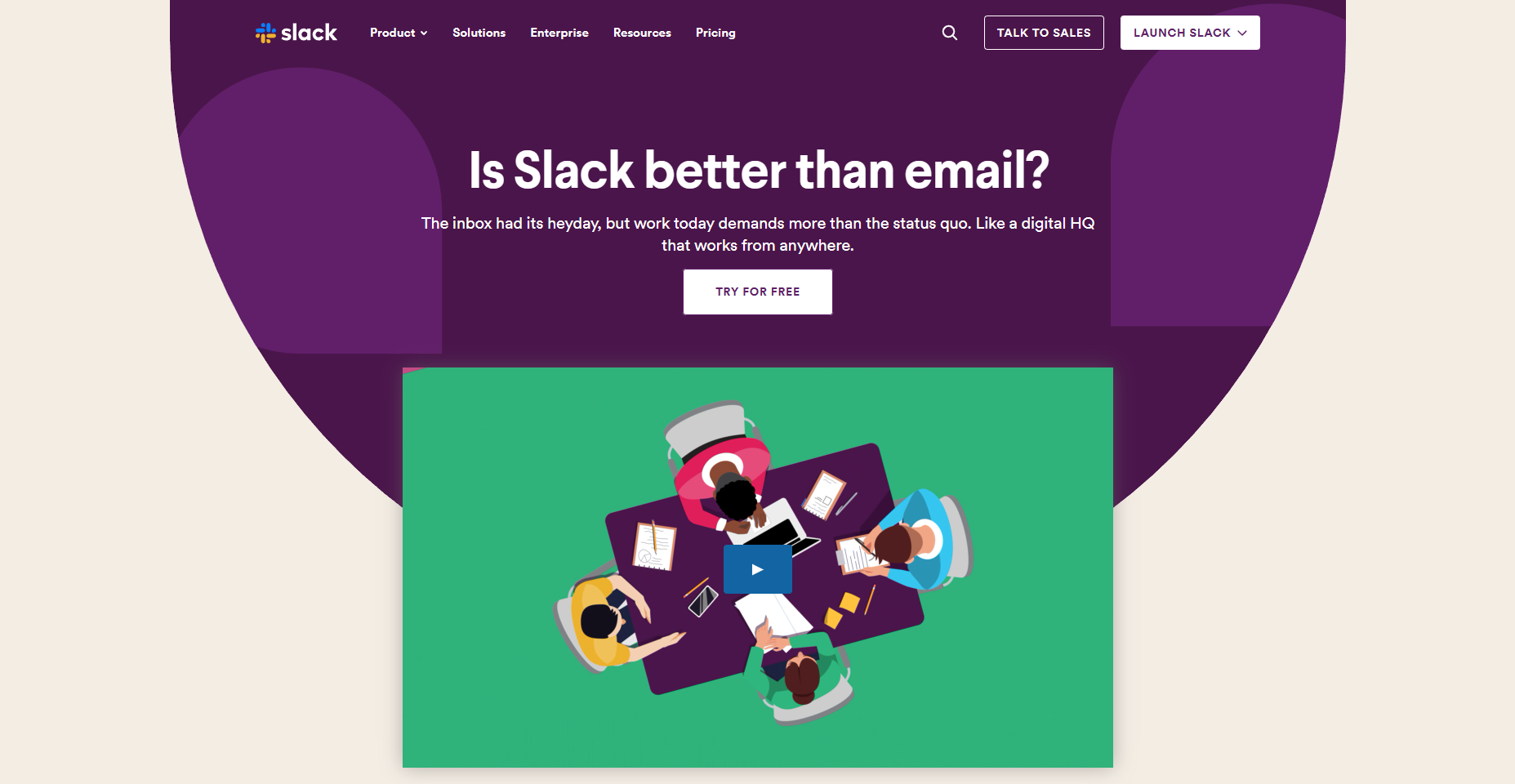
Slack is an instant messenger platform that doubles as a team communication and collaboration tool.
Its users can communicate, share files, and collaborate on projects.
Some specific features of Slack that may be particularly useful for marketers include:
- Instant messaging – Slack allows users to send messages to one another in real time, replacing the need for an email thread about the tasks and projects.
- File sharing – Allows users to share files with individuals or channels, including documents, images, and videos. This is useful for marketers looking for an effective way to collaborate on content projects with team members or clients.
- Collaboration features – Lets users leave comments on threads and tag people via mentions. These features and others make working together and staying organized easier for team members.
- Integrations – If there are updates on the Trello board or changes made in the Google Drive or Dropbox files, marketers can receive notifications from their Slack channel.
#17 – CoSchedule
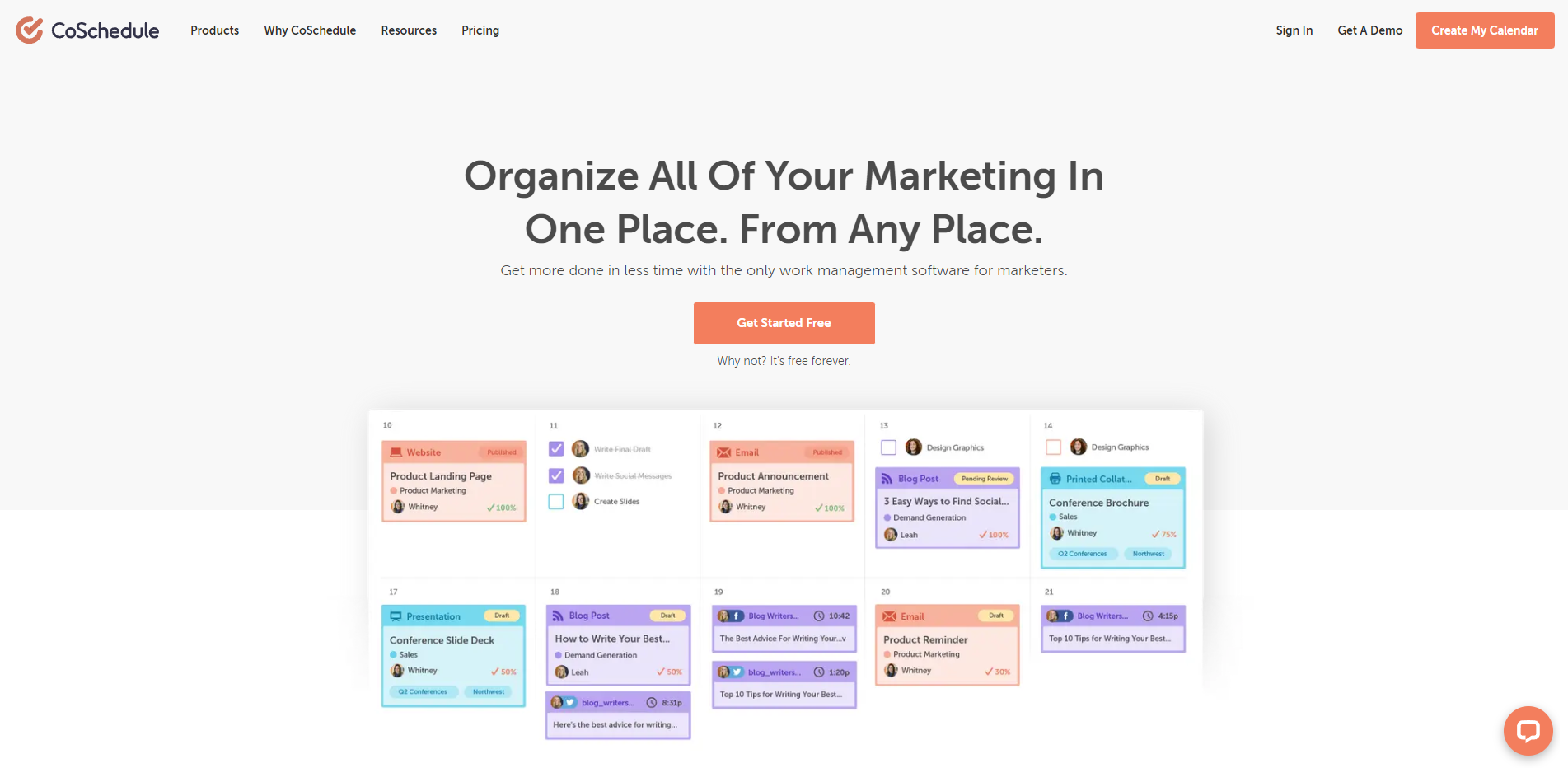
CoSchedule is a project management software designed specifically for marketers.
It helps them plan, organize, and execute their marketing campaigns effectively with team members.
The platform is divided into two products.
The Marketing Calendar provides users with a calendar that lets them see their upcoming posts for publishing and sharing.
Marketers can also integrate their social media accounts to automatically share the posts upon publishing.
You can download its WordPress plugin to set up the calendar from your dashboard and schedule your content from there.
This can be useful for marketers who need to coordinate their efforts and stay on track while saving time.
On the other hand, CoSchedule’s Marketing Suite contains its task management features. They allow users to break down their tasks into smaller, more manageable pieces and track their progress.
This can be useful for marketers who manage multiple tasks and deadlines for their content projects.
Aside from organizing tasks and projects, they can also manage your brand assets in a single place.
Marketing managers can save social images, infographics, blog headers, and other assets the team can reuse in their upcoming campaigns. This keeps their initiatives consistent and in line with their desired branding.
Content Optimization
Before publishing your blog posts, it’s best to optimize each one first based on their target keywords. And since you must optimize each piece differently, you must use either tool below. They will help identify how to make your content more SEO-friendly:
#18 – Surfer SEO
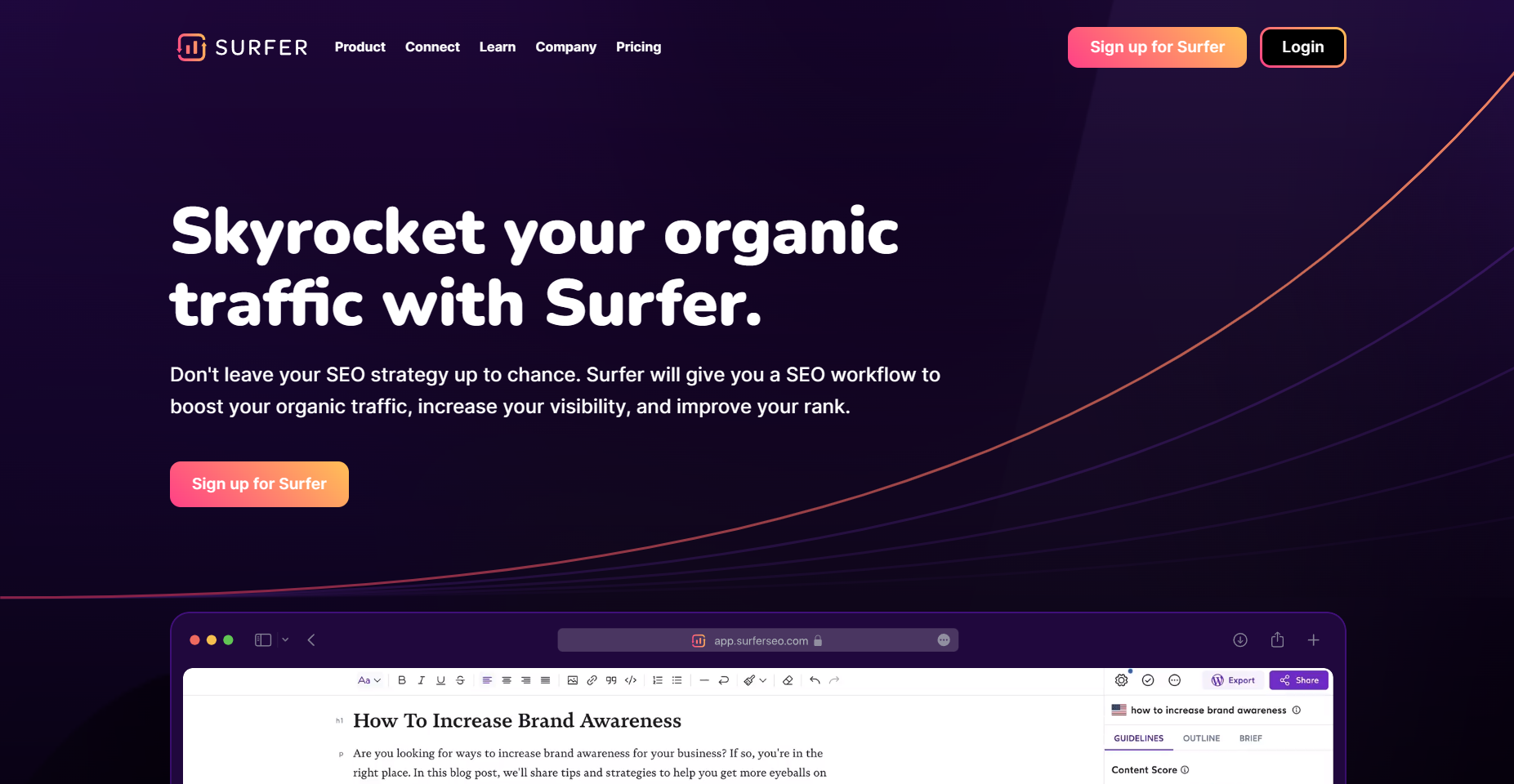
Among the SEO content tools in this list, Surfer SEO is the best content marketing tool for me.
It helps users improve the performance of their web pages in search engine results. It mainly provides suggestions for improving their content to rank higher in search results.
A few key features of Surfer SEO that may be especially valuable for marketers are:
- SERP Analyzer – Analyzes the pages ranking on Google for their keyword and shows them each page’s title tags, meta descriptions, headings, and word count. They can then use these factors to create much better content than their competitors.
- Content Editor – Gathers natural language processing (NLP) keywords to be included in their content based on the top-ranking competitors. The more keywords they can incorporate in the content, the higher the score will be, and the higher the content’s chances of ranking on Google.
- Audit – Analyzes the published content based on its target keywords. From here, Surfer SEO provides users with suggestions for optimizing their content to rank higher in search results, including suggestions for improving on-page SEO, adding internal and external links, and using header tags effectively.
#19 – Frase
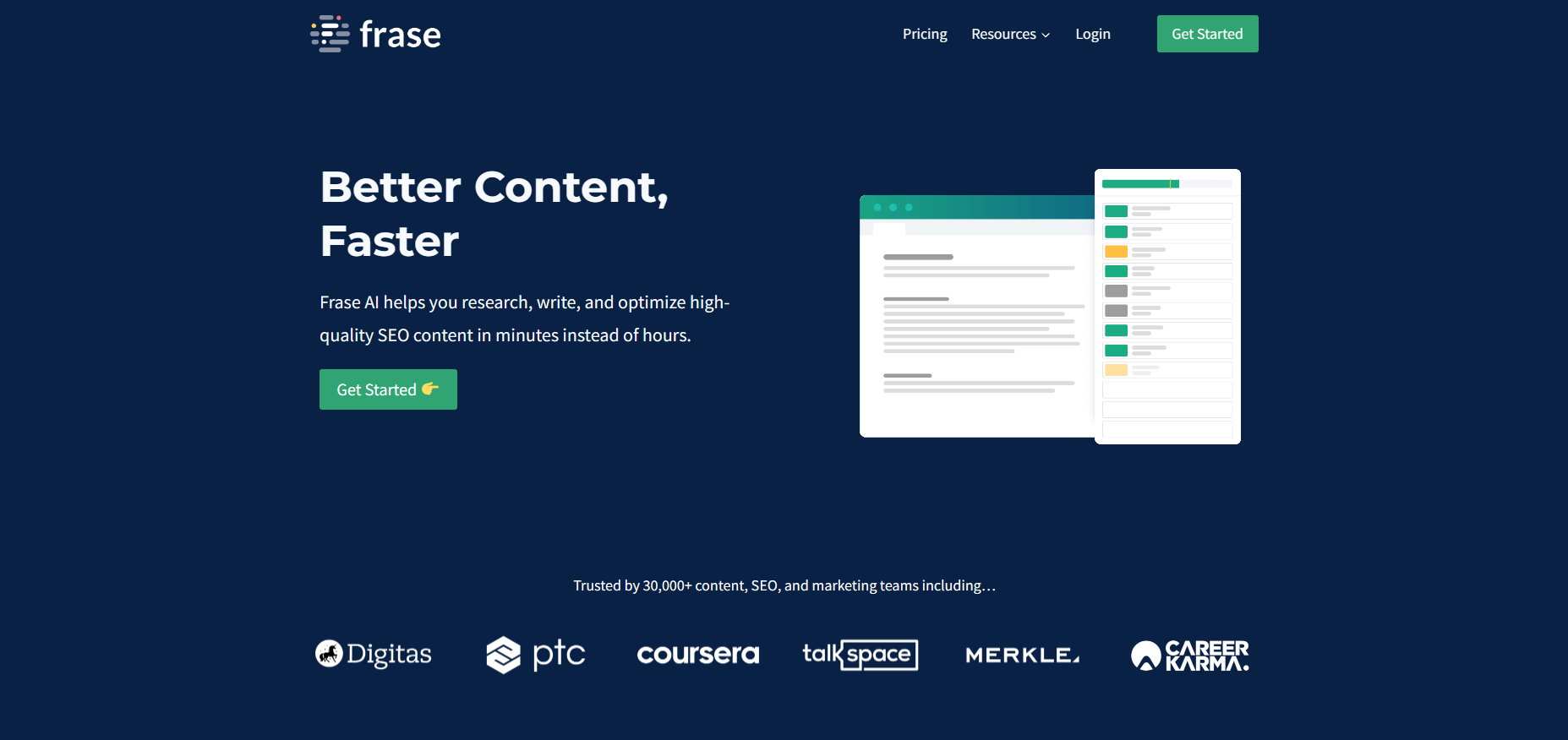
Frase is a content writing software that helps users identify and categorize opportunities for creating SEO-optimized content.
It allows users to structure their content based on top-ranking search results and provides a content score that can be improved by adding relevant topics.
When users click on a topic, Frase shows related topics and where they are mentioned in search results, helping users explore and optimize their content.
Frase also includes a built-in AI writing tool that can generate well-written original content and sounds relatively human-like.
Content Sharing and Distribution
The next step is sharing the content across different online channels to maximize the reach and deliver the content straight to the target audience. Below are tools that will help marketers achieve this goal:
#20 – Hootsuite

Hootsuite is a social media management platform that allows users to schedule and publish social media posts, engage with followers, and track the performance of their social media efforts.
It is a good content promotion tool for marketers because it provides a centralized place to manage and track the performance of social media campaigns, allowing marketers to efficiently publish and promote their content across multiple social media networks.
Hootsuite also offers analytics and reporting features that can help marketers measure the effectiveness of their content promotion efforts and make data-driven decisions about their social media strategy.
Additionally, Hootsuite provides tools for collaborating with team members and managing social media accounts for clients, making it a useful tool for agencies and teams working on social media marketing campaigns.
#21 – Contentstudio
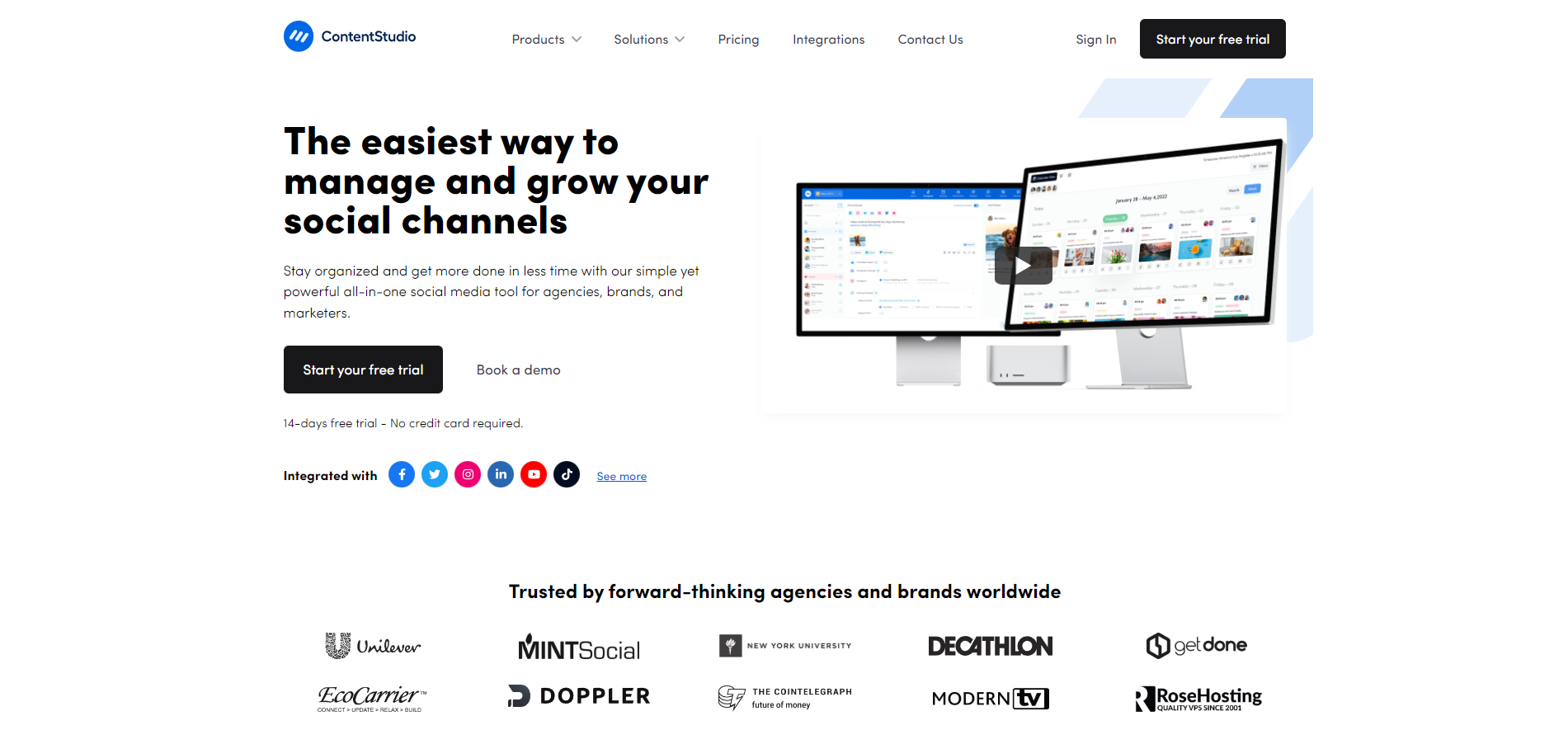
ContentStudio is a content marketing automation and social media management tool that uses data and AI to help businesses discover, plan, compose, and share engaging content on various social media and blog channels.
It offers a range of features designed to streamline content and social media workflows. Some of them include the following:
- Identifying the best-performing and trending content in their respective topics. This helps them keep in touch with what their audience wants.
- Seeing what their competitors are doing and emulating their strategies onto their campaigns.
- Scheduling content on multiple social media networks to fill out their content calendar with the best content possible.
- Collaborating with team members to help improve efficiency by working on tasks and projects together.
With ContentStudio, content marketers can create campaigns by combining multimedia content and scheduling them to be published on one or multiple social platforms. This makes their jobs much easier, as they can handle all the tasks above in a single dashboard.
The tool also provides amplification features such as hashtag suggestions and image enhancement to help optimize engagement.
#22 – MissingLettr
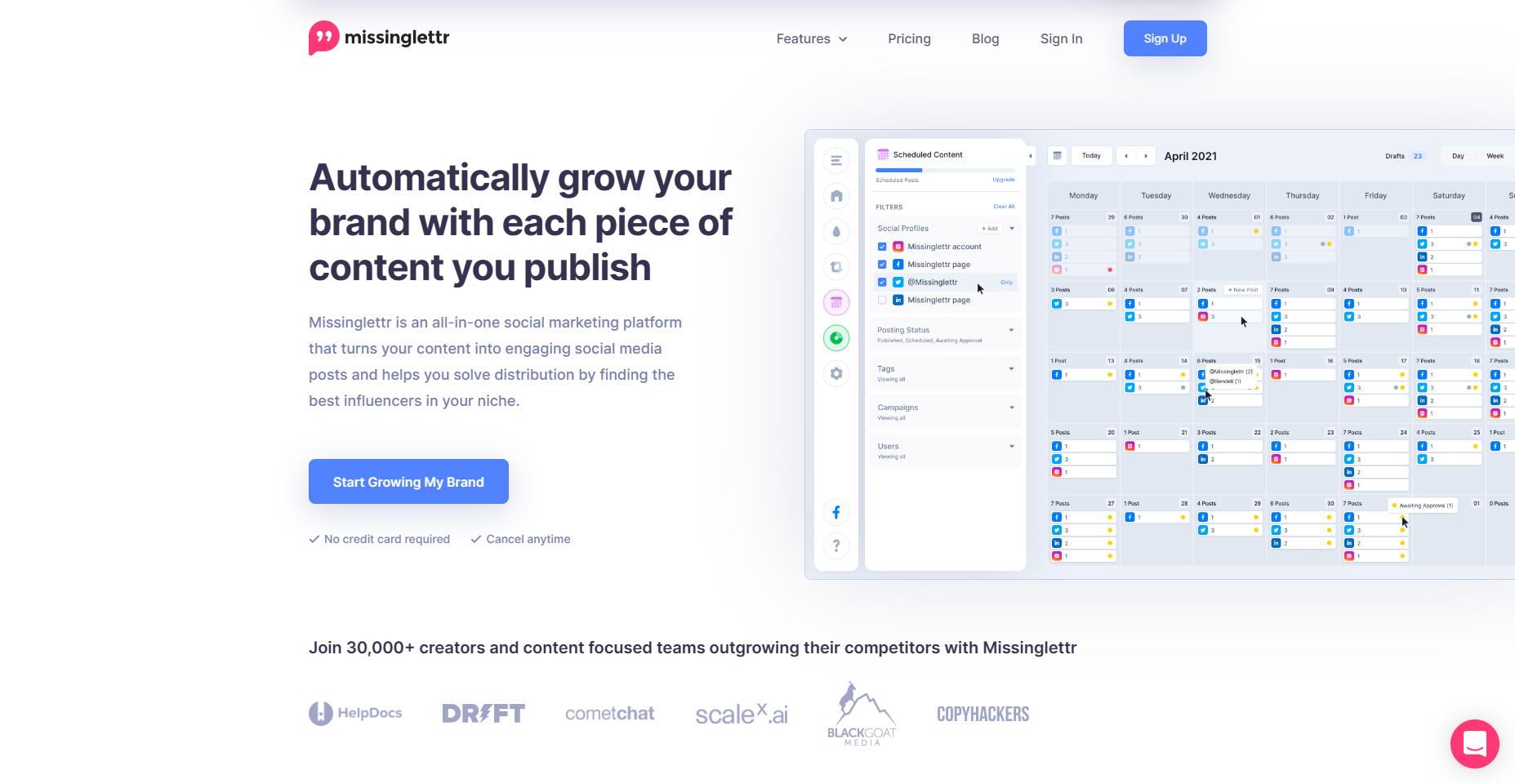
Missinglettr is a social media marketing software that helps bloggers and content marketers amplify their existing content by creating social media posts and scheduling them across multiple platforms.
The platform offers customizable templates and enables administrators to create content for automated email campaigns or drip marketing. It also allows professionals to receive feedback and gain insight into campaign analytics.
Teams can use Missinglettr to republish blog posts on Medium automatically, receive suggestions for popular hashtags, and create backlinks to the original post when publishing on social media.
The platform also includes a postbox module that allows users to create communities and add content to a library that other users can share to increase post engagement.
Content Analytics
Over time, content marketers would want to see how their blog posts performed. Did it generate lots of traffic? Why or why not? More importantly, what is the next steps for their upcoming campaign? These tools will help fill in the blanks for them:
#23 – Google Analytics

Google Analytics is a free web analytics service offered by Google for tracking site metrics and reporting website traffic.
It is a good content analytics tool for marketers because it provides a wealth of data and insights about how users interact with a website, including information about the pages they visit, the source of their traffic, and their demographics.
This information can help marketers understand what content is performing well and where there may be opportunities to improve.
With Google Analytics, marketers can also set up goals and track conversions, allowing them to measure the effectiveness of their marketing efforts and make data-driven decisions about their strategy.
#24 – Google Search Console
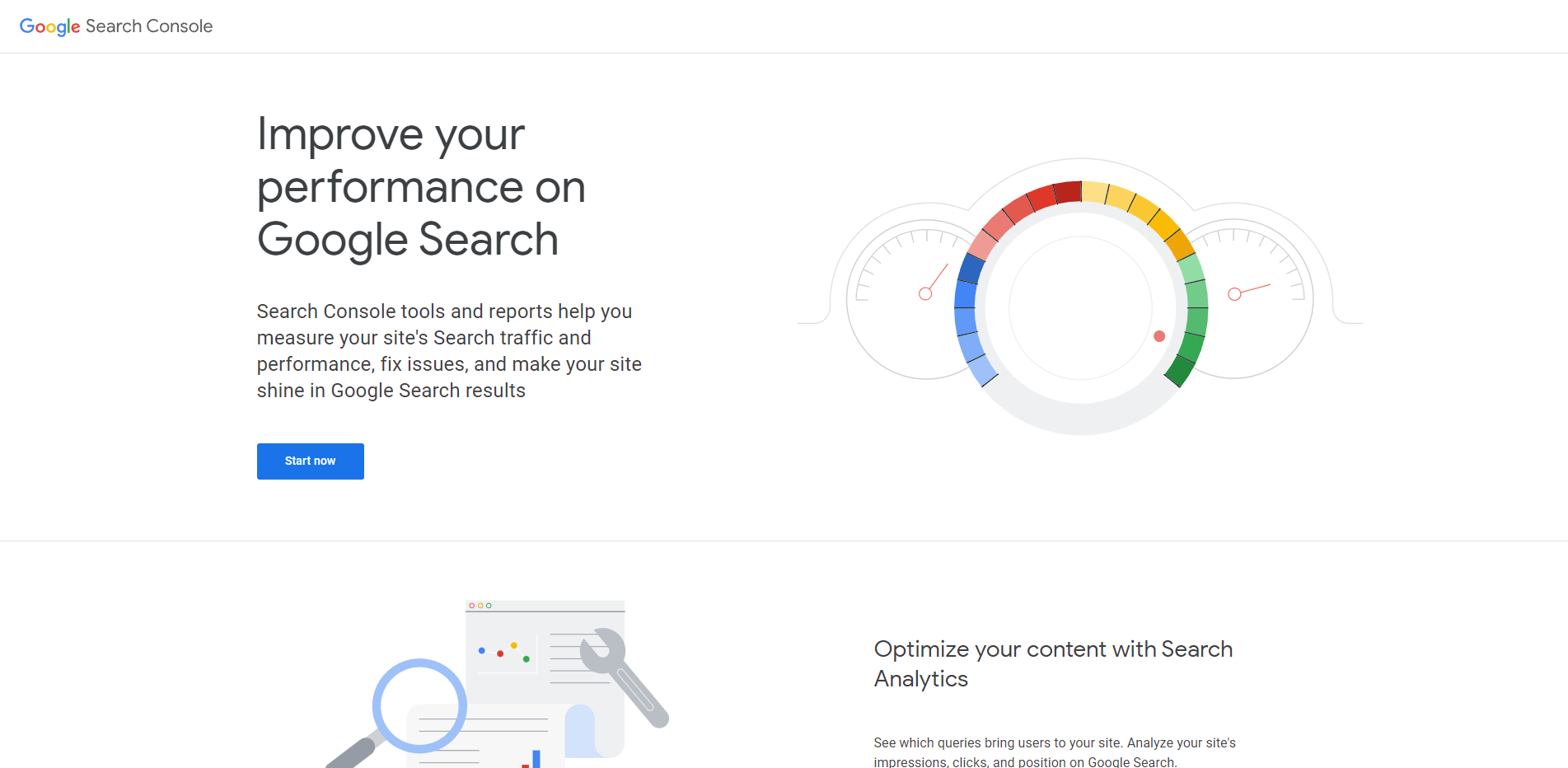
Google Search Console (GSC) is another free web service offered by Google that helps website owners monitor and maintain their site’s presence in Google search results.
It is a good content analytics tool for marketers because it provides insights into how Google indexes a website and which queries drive traffic.
This information can help marketers understand how their content is performing in search and identify any technical issues affecting their search visibility.
GSC also lets marketers see which pages on their site receive the most clicks and impressions in search results. The data they’ll gather here allows them to optimize their content for specific keywords and improve their search rankings.
Additionally, Google Search Console alerts about any issues affecting a website’s performance, such as crawl errors or security breaches, helping marketers keep their site healthy and visible in search results.
#25 – SE Ranking

SE Ranking is an SEO software and rank tracking tool that allows users to monitor their rankings in all major search engines for various locations, languages, and types of traffic.
It helps users track the positions of their keywords and check the snippet design for each keyword.
SE Ranking also includes a Page Changes Monitor that allows users to track any changes made to their projects and a Backlink Monitor that helps users quickly find missing backlinks.
These features can be helpful for SEO experts, content managers, developers, and others who want to keep track of their site’s performance and make informed decisions about their SEO strategy.
Conclusion
The right content marketing tools are essential for creating and distributing high-quality content that engages your audience and drives results for their digital marketing campaign.
The multiple content marketing tools outlined in this article are some of the best available. They can help you streamline your content marketing efforts and achieve your goals more efficiently.

